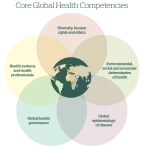 This month the BMA released a report on the need for pre and post-graduate medical education and training to adapt in the face of a rapidly “changing world.”
This month the BMA released a report on the need for pre and post-graduate medical education and training to adapt in the face of a rapidly “changing world.”
We are pleased to see recognition of the need to update postgraduate competencies. However, as doctors in training who are dedicated to the integration of global health into current postgraduate training programmes, we fear that there are important gaps that have not been adequately addressed. The report recognises increased complexity in “characteristics of the population” and “public expectations of healthcare,” but we believe that equally important is the increasing complexity of social, political, and economic systems which profoundly influence health.
We feel that the BMA document does not take a wide enough view of our changing world. While it is important to recognise the evolution of behaviours, lifestyles, and the diseases that we see and treat, it is also important to recognise how the opportunities and challenges to address health issues are evolving. Our roles and ability to improve health are determined by issues outside the sphere of local population characteristics and expectations.
Globalisation means that the world is ever more interconnected, and every health professional is affected by and has an influence on global forces. For example, doctors rely on and are involved in global trade systems when they prescribe medications or use medical devices. An increasing number of state and corporate actors play a part in determining economic determinants of health, from the price of drugs (the price of pyrimethamine and cycloserine, covered in The Guardian and New York Times, are recent examples) to the wealth or poverty of nations and people. Recently, increasing international migration has brought home the concept of globalisation and the profound influence of global forces.
Our understanding of health and illness, and our ability to manage them, is affected by multiple overarching factors, including technological advances; governance structures; and knowledge advances in the subjects of the environment, sociology, epidemiology, and systems thinking.
Because the world is changing at an unprecendented rate, tomorrow’s doctors require not only knowledge of the current situation, but also the skills to learn about and adapt to future scenarios.
The report explores a doctor’s experience of the workplace and career pathway. While it goes some way to acknowledging the changing nature of health workforces, the report does not explore the implications of health worker migration for health professionals today and in the future. Trainees need to learn to play a part in establishing efficient and effective health systems for the benefit of all staff and service users. By engendering an ethos of leadership, in a culture of learning, and with an awareness of the wider determinants of health, career satisfaction will potentially follow.
As an influential player in the development of doctors’ training, it is essential that the BMA sets out a vision that is responsive to the ever changing political, social, environmental, and economic context. This context defines the health needs of the population and the roles that doctors can have in protecting, restoring, and promoting health. We believe that the BMA has provided timely guidance on postgraduate training, and we hope that the BMA will develop the guidance to promote training fit for our evolving and interdependent world.
Sarah Walpole and May van Schalkwyk on behalf of the Global Health Curriculum group.
Sarah Walpole is a medical registrar, currently working at the Sustainable Healthcare Education network and Freedom from Torture.
May van Schalkwyk is a foundation year two doctor in London. The Global Health Curriculum group works to identify learning needs and support the implementation of training on global health.
Competing interests:
May van Schalkwyk has no competing interests.
Sarah Walpole was the Green Party parliamentary candidate for Hull East in the 2015 UK general election.
